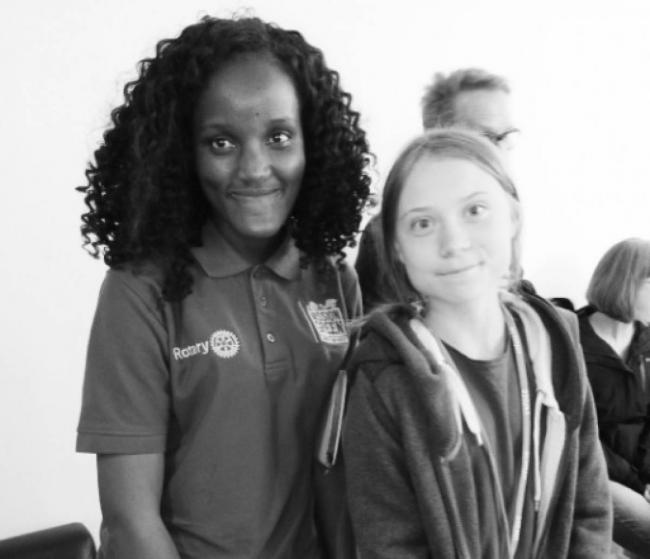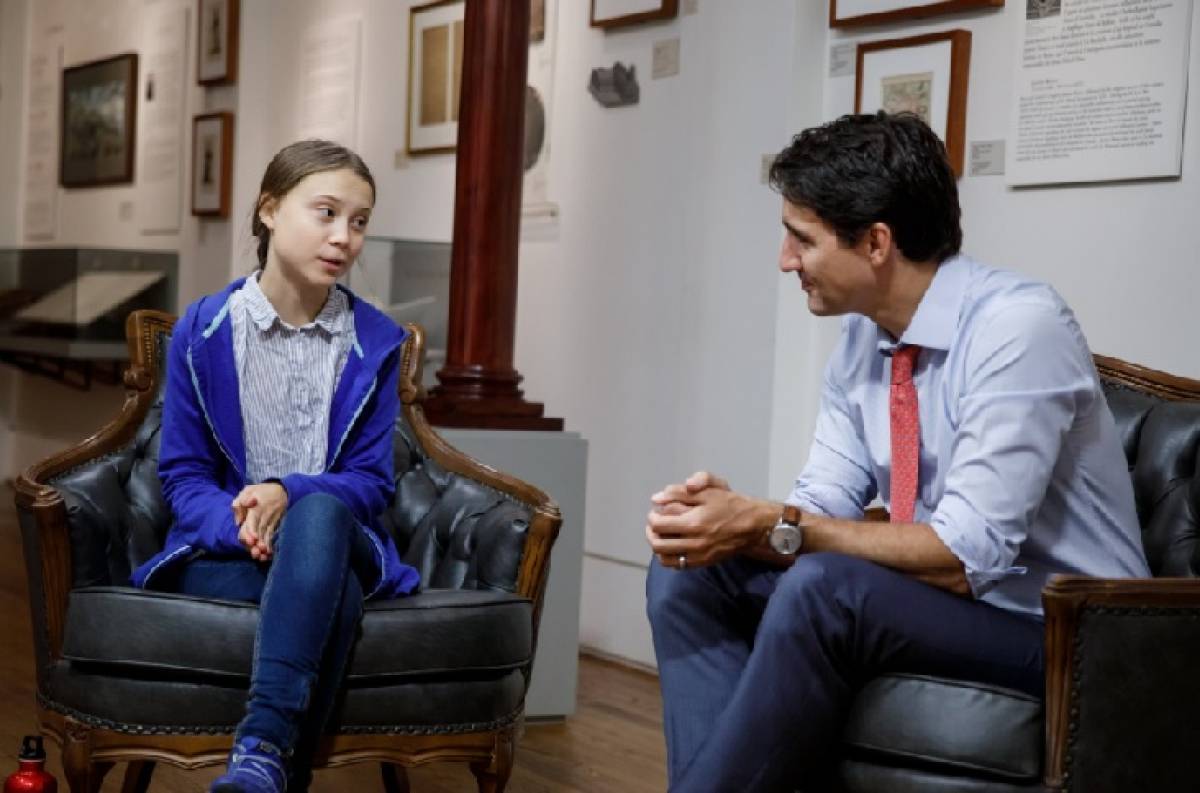Articles Menu

Oct. 31, 2021
In advance of the COP 26 meetings in Glasgow, young climate activists Greta Thunberg and Vanessa Nakate, founder of the Rise Up Movement, issued an open letter to the media.
They urged editors to pay far more attention to the Global North's "moral responsibility to move much faster in reducing their emissions".
That's because by the end of this year, 89 percent of the world's carbon budget will have been burned if the planet has even a 66 percent chance of remaining below a 1.5° C temperature increase since the start of the Industrial Revolution.
"To stay below the targets set in the Paris Agreement, and thereby minimize the risks of setting off irreversible chain reactions beyond human control, we need immediate, drastic, annual emission reductions unlike anything the world has ever seen," Thunberg and Nakate wrote.
"And as we don’t have the technological solutions that alone will do anything close to that in the foreseeable future, it means we have to make fundamental changes in our society."
(For more on how young people are being victimized by the pie-in-the-sky technology obsession, read this article.)
Thunberg and Nakate pleaded to the media as being "among our last hopes".
They noted that no one else "has the possibility and the opportunity to reach as many people in the extremely short timeframe we have".
They closed their letter by declaring that "history will judge you."
Anyone paying serious attention to the climate breakdown realizes that international media barons, led by Rupert Murdoch, have been an accessory to the crime of the century.
That case was made in a compelling way by B.C. writers Peter D. Carter and Elizabeth Woodworth in their 2018 book Unprecedented Crime: Climate Science Denial and Game Changers for Survival.
But it's not just Murdoch's irresponsible New York Post and FOX News and a fleet of Canadian climate fools working in media who have aided and abetted what amounts to mass murder on an unprecedented scale by global political leaders and corporate CEOs.
(In this short commentary written a decade ago, I noted that history wasn't going to be kind to some of the Canadian commentators.)
Even liberal media, like MSNBC, have devoted very little attention to the climate for a very long time. Darlings of progressives—like Laurence O'Donnell—don't really see the climate as their beat. It's obvious to anyone who watches his program.
To O'Donnell, the biggest story in the world is the Republican threat to U.S. democracy. That offers up higher ratings than a serious exploration of climate feedback loops putting human civilization on the road to extinction.
The Republicans' big lie about the 2020 presidential election is worthy of coverage. The same can be said for the plight of Hong Kong residents coming under the boot of Chinese dictator Xi Jinping, which generates tremendous attention in the Canadian media.
But there will likely be very little left of Hong Kong if we don't quickly rein in the climate breakdown. And there will be no democracy in America if temperatures continue to soar in areas where the U.S. is growing grain and other food products.
That's because society will break down in the face of massive famine, likely leading to either civil war or gang-style control of neighbourhoods.
So the media corporations need to step up their game.
"Big Carbon could never have been able to continue its polluting ways—long after the scientific community had reached consensus about the connection between fossil-fuel emissions, global warming, and climate change—without the assistance of the media," Carter and Woodworth wrote in their book.
As evidence, they noted that not a single question about climate was asked in three presidential debates in 2016.

In the 2021 election campaign, Canadian media outlets did not press the Liberals about the feasibility of basing so much of their climate plan on the oil and gas industry capturing their emissions and burying them underground.
If you can believe it, the Canadian fossil-fuel sector and the Canada Energy Regulator actually insist that oil production will continue rising in this country over the next two decades.
And no one in the Liberal government, not even Environment and Climate Change Minister Steven Guilbeault, has officially repudiated that. This is notwithstanding all the weasel words about sharply reducing emissions in the Liberal platform.
Is it any wonder that Canada is the worst country in the G7 when it comes to meeting its commitments under the Paris Agreement?
Unfortunately, many assignment editors aren't that interested in pursuing this contradiction because there simply aren't enough clicks in covering the climate. It can't be monetized, unlike coverage of real estate, crime, COVID-19, and a multitude of other issues that attract eyeballs to websites. And major media outlets in Canada have been reluctant to create climate units, unlike the Guardian and the BBC.
Sure, they'll run a bunch of articles and conduct televised interviews during the COP26 conference. And they'll still cover the growing number of extreme weather events linked to the climate. But it may take a few more years before the climate emergency becomes a bread-and-butter preoccupation, like national and provincial politics or the pandemic or the National Hockey League.
In the meantime, British Columbians learned what a 1.1° C increase in global temperature since the start of the Industrial Revolution felt like with the heat wave and raging forest fires. What's it going to feel like when the increase reaches 1.5° or 2.0° or even 2.7° or 3°?
The costs of climate inaction are growing. Carter and Woodworth cited a report by DARA International that estimated 400,000 people die each year due to climate change, which is expected to rise to 600,000 by 2030.
But that report was written before we've learned more about the ways that slowing jet streams are possibly trapping heat in the Northern Hemisphere in the summer. A heat dome led to 570 climate-related deaths in B.C. this past summer, according to the coroners service.
So I expect that things may end up being worse than DARA's forecast, given all B.C. communities that shattered the previous Canadian temperature record this summer.
This week, I was stopped in my tracks by a tweet by Eric Doherty, a transportation-planning consultant and one of B.C.'s most knowledgeable residents on the climate crisis.
"If things don't start shifting faster, civilization is cooked," Doherty wrote. "And people under 45 are realizing collapse could hit before they are 65. if you are in late 60s, not such a big deal."
The letter by Thunberg and Nakate drives home Doherty's point.
If you've gotten this far and you think that he is being overly dramatic, I have a movie review to recommend to you. All you have to do is click this link. Yes, a movie review. Trust me on this.
[Top photo: Climate activists Vanessa Nakate and Greta Thunberg were photographed together at COP25 in Madrid in 2019. Now, they've issued a joint letter to the media in advance of the Glasgow meetings.VANESSA NAKATE]